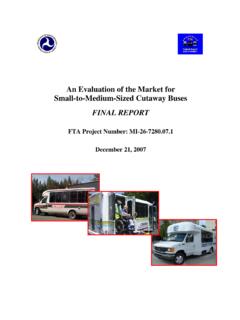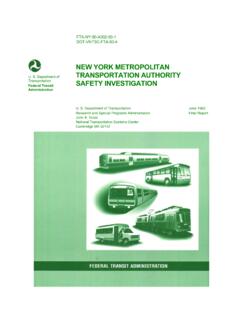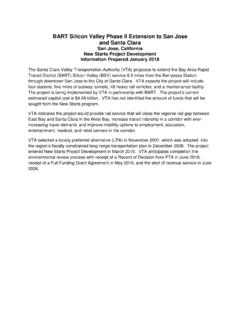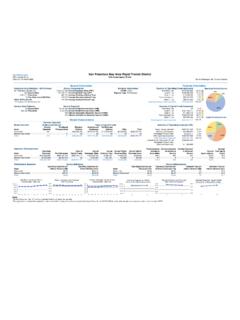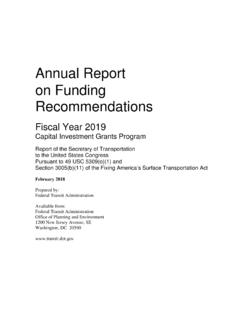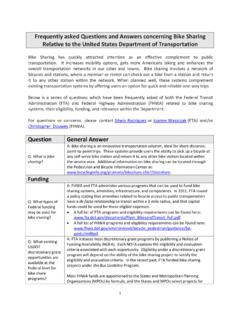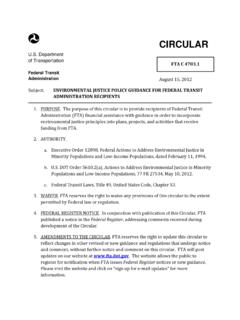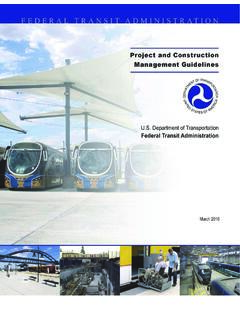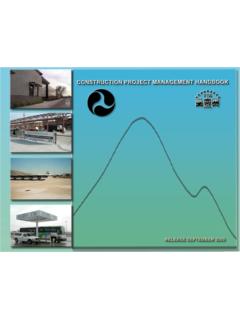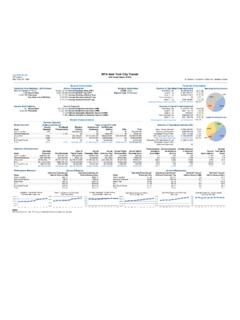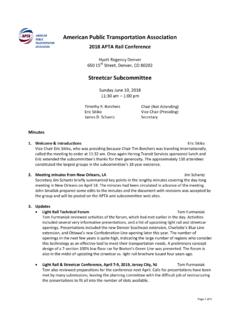Transcription of Federal Transit Administration and American Public ...
1 FTA-APTA Performance-Based Planning and Programming Roundtables Updated April 2018 Summary Report 1 Federal Transit Administration and American Public transportation association Performance-Based Planning and Programming Roundtable Series Summary Report Update April 2018 FTA-APTA Performance-Based Planning and Programming Roundtables Updated April 2018 Summary Report 2 Table of Contents Executive Summary ..3 Background ..4 Performance-based planning and programming .. 4 Legislative requirements .. 4 Planning Final Rule .. 5 Transit Asset Management Final Rule .. 5 Public transportation Safety Rules .. 6 Purpose of roundtables.
2 6 Roundtable Structure .. 7 Roundtables Overview ..8 Roundtable locations .. 9 Roundtable statistics .. 10 Host agencies and participating agencies .. 10 National Webinars .. 11 Cross-Roundtable Themes .. 12 Familiarity with performance management .. 13 13 Staff and resource constraints .. 14 Target setting and reporting .. 15 Targets and consequences .. 15 Competition for limited funding .. 16 Agency culture .. 16 Rating system and asset type consistency .. 17 Data collection and sharing .. 18 Best practices .. 18 Coordination between Transit agencies, MPOs, and State DOTs .. 19 Communicating data .. 19 Training and technical assistance.
3 19 Conclusion .. 21 Participant feedback .. 21 Future outreach .. 21 Appendices .. [Available upon request] Appendix 1: FTA Presentations .. Appendix 2: Panelist Presentations .. Appendix 3: Participant Lists by Roundtable .. Appendix 4: Performance-based Planning and Programming Resources .. Appendix 5: Panelist Guidance .. Appendix 6: Roundtable Agendas .. Appendix 7: Feedback from Evaluation Forms .. Appendix 8: Breakdown by Roundtable .. FTA-APTA Performance-Based Planning and Programming Roundtables Updated April 2018 Summary Report 3 Executive Summary Purpose of Performance-based Planning and Programming Roundtables The Federal Transit Administration (FTA) of the Department of transportation (USDOT), in partnership with the American Public transportation association (APTA), held eleven peer-exchange roundtables and two national webinars on performance-based planning and programming (PBPP) in fiscal years 2016 - 2018.
4 The PBPP roundtables were intended to engage Transit agencies, metropolitan planning organizations (MPOs), and State and Federal leadership in discussions about performance-based planning, the metropolitan planning process, Transit asset management, and safety. Roundtable participants also shared information and insights about what is working, where there is room for improvement, and how they can establish regional and statewide performance targets and prioritize investment priorities as part of a performance-based approach to transportation planning. At each roundtable, FTA staff provided an overview of the key requirements, and participants shared the challenges and opportunities they are facing in implementing PBPP.
5 They also discussed how PBPP can be leveraged to obtain resources to improve Transit system state of good repair (SGR) and safety. A planning team which consisted of representatives from FTA, APTA, APTA subcommittees on performance management, the USDOT Volpe Center, FTA Regional Offices, and local roundtable hosts targeted geographically diverse roundtable locations in order to provide broad opportunity for participation. Two initial FTA-APTA PBPP roundtables took place in Washington, , and Salt Lake City, UT, in December 2015 and February 2016. The initial roundtables targeted the fifty largest Transit agencies in the country. Based upon feedback from the initial roundtables, FTA hosted nine additional roundtables to reach out to small and medium-sized Transit agencies and MPOs.
6 These roundtables were held in Albany, NY, in May 2016; Charlotte, NC, in May 2016; Fort Worth, TX, in June 2016; Kansas City, MO, in August 2016; Seattle, WA, in September 2016; Baltimore, MD, in January 2017; Reno, NV, in May 2017; Chicago, IL, in August 2017, and Atlanta, GA, in November 2017. Additionally, FTA hosted two national webinars took place in June and November 2017 that had over six hundred total participants. Several key themes were expressed across all roundtables. These included the benefits of PBPP; improved familiarity with performance management; staff and resource constraints; competition between highway and Transit projects for funding; cultural challenges; concerns about setting performance targets in a financially constrained environment; data collection, availability, and management; and concerns about the timelines associated with FTA s rulemaking.
7 Roundtable participants demonstrated varying levels of maturity in their implementation of performance-based planning and performance management. In the fiscal year 2017 and 2018 roundtables, participants demonstrated an evolving understanding of elements of the rulemaking. During the later events, additional themes emerged including best practices in coordinating across agencies and the importance of clear communication and coordination in target setting and data and information sharing among planning partners. From participant feedback, it is evident that the PBPP roundtables were a welcome and helpful overture from FTA. Transit agency and MPO executives as well as lead technical staff benefited from the opportunity to voice concerns and interact in an open, collaborative forum with FTA leadership, regional FTA-APTA Performance-Based Planning and Programming Roundtables Updated April 2018 Summary Report 4 staff, and peers.
8 FTA plans to continue the success of the first series of PBPP roundtables in advancing this dialogue and expand support and technical assistance for Transit agencies and MPOs as they incorporate performance management into their planning and programming processes, as required by Federal legislation. FTA believes the networking opportunities provided by the roundtable series will further expand development and sharing of best practices as local and regional practitioners implement Federal requirements for performance-based planning processes. Background Performance-based planning and programming Performance-based planning and programming (PBPP) is a component of performance management.
9 Performance management is a strategic approach that uses performance data to inform decisions in order to help achieve desired performance outcomes. When implemented effectively, performance management can improve project and program delivery, inform investment decision-making, focus staff on leadership priorities, and provide greater transparency and accountability to the Public . Many metropolitan planning organizations (MPOs), Transit agencies, and State departments of transportation (State DOTs) currently prioritize investment decisions based upon local goals and objectives, and apply a data-driven approach to the selection of transportation projects.
10 Agencies typically apply screening or ranking criteria developed by local decision-makers to identify and prioritize projects that best meet regional goals. This process has created a foundation that can be applied to performance measures established by Federal regulations, which are intended to augment, not replace, local performance-based planning activities. The PBPP roundtables, led by the Federal Transit Administration (FTA) in partnership with the American Public transportation association (APTA), were held to facilitate a conversation among MPOs, Transit agencies, and State DOTs about how to best transition to a performance-based planning process.
